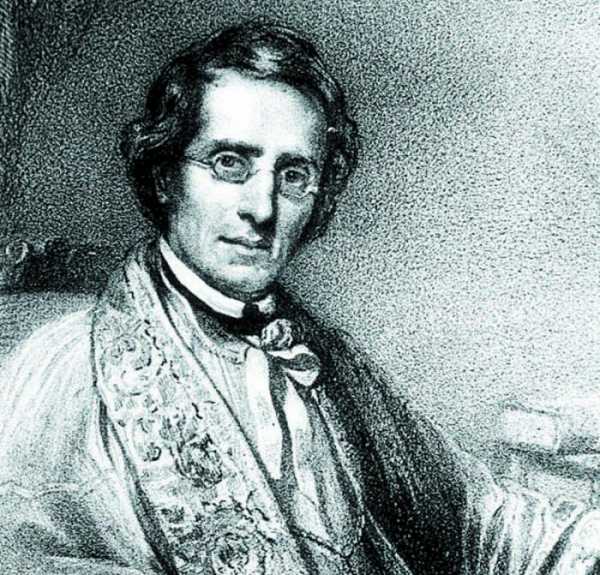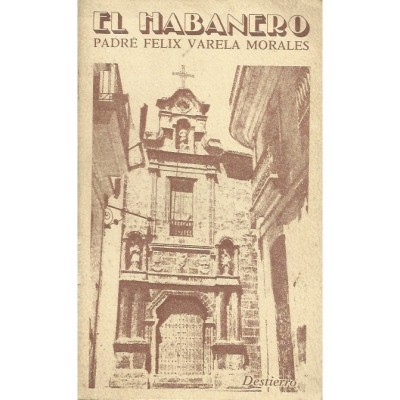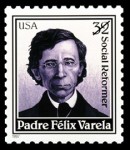 A celebration of the life and legacy of Padre Félix Varela (1788-1853), on the 230th anniversary of his birth. Varela was an outstanding scholar and paramount figure in the gestation of a Cuban national identity in the first half of the 19th century. His influence on intellectual thought and progressive ideas in Cuba, including equal education for women, the abolition of slavery, and the cause for the Island’s independence, cannot be overestimated. In the United States, his work in defense of immigrants in New York City, as well as his exemplary ministry in the service of others, earned him a lasting distinction as a social reformer and a path toward sainthood in the Catholic Church.
A celebration of the life and legacy of Padre Félix Varela (1788-1853), on the 230th anniversary of his birth. Varela was an outstanding scholar and paramount figure in the gestation of a Cuban national identity in the first half of the 19th century. His influence on intellectual thought and progressive ideas in Cuba, including equal education for women, the abolition of slavery, and the cause for the Island’s independence, cannot be overestimated. In the United States, his work in defense of immigrants in New York City, as well as his exemplary ministry in the service of others, earned him a lasting distinction as a social reformer and a path toward sainthood in the Catholic Church.
The commemorative presentation will be held at the Church of the Transfiguration, founded by Padre Varela, and will include a 1988 in-depth profile of Varela written by Mons. Raúl del Valle, which will be read by Bishop Osvaldo Cisneros, of the Diocese of Brooklyn. Bishop Cisneros was named a Prelate of Honor by Pope John Paul II in 1988. He presently serves as vice-postulator of the Cause for Canonization of the Servant of God Félix Varela. He is a founding member and president of the Félix Varela Foundation.
This event will be held in Spanish with simultaneous English translation through earphones.
CHURCH OF THE TRANSFIGURATION
29 Mott St, NYC
FREE ADMISSION
RSVP at: info@cubanculturalcenter.org
FÉLIX VARELA was born in Havana on November 20, 1788, and raised in St. Augustine, Florida. He was sent to Havana to study at the San Carlos Seminary, where years later he would become its most brilliant professor, teaching Philosophy, Chemistry, Physics, Theology and Music. He was ordained priest in 1811. Many future Cuban leaders and intellectuals were his students. He argued for giving women the same education as men, and introduced many teaching innovations. In 1816, a compilation of earlier written works was published under the title Doctrines in Logic, Metaphysics and Ethics.
 In 1821 he was elected to the Spanish Cortes, where he recommended that Spanish colonies in Latin America be considered independent. He also asked for Cuban self-rule and an end to slavery. Two years later, in 1823, the Spanish Crown condemned him to death, but he escaped and made his way to New York, where he arrived in December 1823. He lived the rest of his life in the United States. In New York he was assigned to a parish in the Irish section, and even though there were many ethnic problems at the time, he became an advocate for immigrant rights and of the poor. In 1824 Varela began to publish an independent journal:
In 1821 he was elected to the Spanish Cortes, where he recommended that Spanish colonies in Latin America be considered independent. He also asked for Cuban self-rule and an end to slavery. Two years later, in 1823, the Spanish Crown condemned him to death, but he escaped and made his way to New York, where he arrived in December 1823. He lived the rest of his life in the United States. In New York he was assigned to a parish in the Irish section, and even though there were many ethnic problems at the time, he became an advocate for immigrant rights and of the poor. In 1824 Varela began to publish an independent journal:
El Habanero (pictured above), the first Spanish-language newspaper in the United States.
It promoted Cuban independence and was smuggled into the Island. He published other newspapers in Spanish, including El Mensajero Semanal, and also in English The Protestant’s Abridger and Annotator. He wrote many articles on human rights, as well as multiple essays on religious tolerance, cooperation between the English and Spanish-speaking communities, and the importance of education.
Varela led his ministry as priest for over 25 years. In 1837 he was named  Vicar General of the Diocese of New York. At that time, this title also covered the whole state of New York and New Jersey. Varela died on February 25 1853, in St. Augustine, Florida. His remains were moved to Havana on August 22 1912, and buried at Havana University’s Aula Magna. In 1988, on the bicentennial of his birth, the U.S. Postal Service issued a $0.32 stamp in his name (pictured right).
Vicar General of the Diocese of New York. At that time, this title also covered the whole state of New York and New Jersey. Varela died on February 25 1853, in St. Augustine, Florida. His remains were moved to Havana on August 22 1912, and buried at Havana University’s Aula Magna. In 1988, on the bicentennial of his birth, the U.S. Postal Service issued a $0.32 stamp in his name (pictured right).